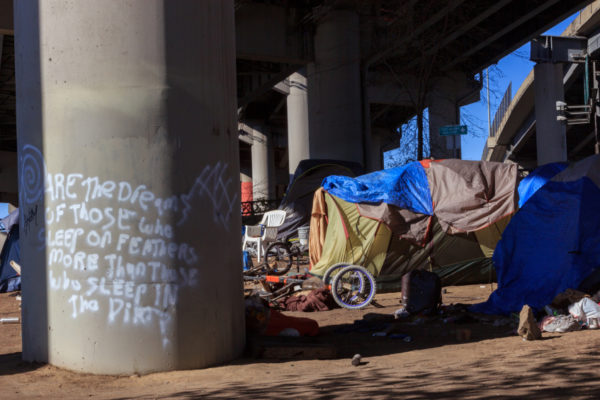In April, Dallas County District Attorney John Creuzot announced a plan to cease prosecutions he deemed “an inhumane approach to dealing with homelessness.”
In San Antonio, District Attorney Joe Gonzales rolled out a policy featuring similar efforts. In Austin, a city that claims to be a bastion of liberalism and compassion, many local officials are working to salvage and revise shameful laws that serve to criminalize homelessness.
One of those ordinances makes it a misdemeanor to “camp in public.” Another relates to sitting or lying on the sidewalk in a large area that encompasses downtown. These laws – and similar ordinances in cities throughout the state – should not be revised. They should be repealed and taken off the books.
Austin’s camping-in-public ordinance stretches the definition of “camping” to include activities such as “storing personal belongings” and “cooking activities,” making any of these a crime if it “appears … that the person … is using a public area for living accommodation purposes.”
In many parts of the country, lawmakers have cited vague notions of public safety, business interests and even promotion of tourism to justify laws similar to those in Austin.
A survey of 187 cities conducted by the National Law Center on Homelessness and Poverty highlighted other egregious examples. They identified 81 cities that decided it was illegal to sleep in a car. Nine percent of the cities surveyed had gone so far as to criminalize sharing food: If you dared to offer your sandwich to a hungry person on the street, you too committed a crime.
Some will harness the politics of fear and warn us of the unintended consequences of eliminating such laws. Perhaps we should instead revisit the intended consequences with which they were enacted. These laws were written for one purpose: to convert poverty into a criminal activity.
Others will suggest that cities could use these ordinances as a mechanism to connect people with services such as case management and rehabilitative programs. Many genuinely felt this way when the laws first passed.
A 2017 study by Austin’s city auditor, however, concluded that these ordinances have not been effective in accomplishing that end. The futility of the effort is compounded by the fact that every dollar we spend enforcing these laws takes away from money that could be spent to feed or house people.
Notably, the report also recognized that by piling on criminal convictions and/or warrants, these ordinances may be creating an additional barrier for homeless men and women who might otherwise be able to obtain housing.
In recent years, an increasing number of courts have called similar laws exactly what they are: laws that unconstitutionally criminalize the status of homelessness. In 2015, the Department of Justice weighed in, as well, addressing City of Boise ordinances that bear strong resemblance to Austin’s, expressing its own concerns that such laws may violate the Constitution.
We should not be discussing the best way to revise discriminatory laws. The proposed revisions seek to limit the circumstances where someone will be cited, but new versions will serve the same purpose that the old ones have.
In fact, one addition describes criminal activity as creating an “unreasonably inconvenient” situation. Any versions of these statutes are destined to be weaponized against a population society has repeatedly cast out and pushed aside.
As someone who works in a law clinic that often represents homeless clients, I dare say that our clients’ collective experience doesn’t support any conclusion to the contrary.
For years, politicians and writers have recalled the idea that a society is measured by how it treats its most vulnerable. For years, we have fallen short. The problem of how to provide housing for everyone in our society is complicated. But across Texas and the rest of the country, we must stop punishing our most vulnerable for our inability to find a solution.
Chris Roberts is a clinical professor of law and the director of Criminal Defense Clinic at The University of Texas at Austin.
A version of this op-ed appeared in the San Antonio Express News, Abilene Reporter News, Amarillo Globe News, and the Austin American Statesman.




